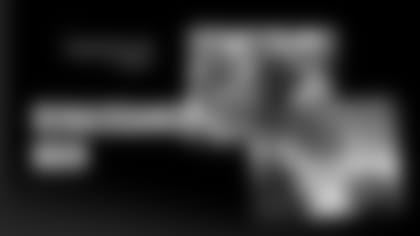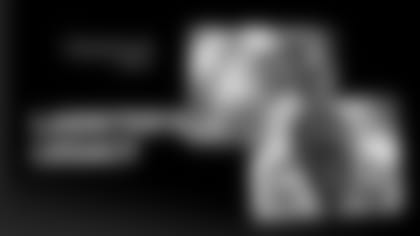Kevin Butler looked up as thousands of Cardinals fans waited to cascade down.
After seven years of pent-up frustration, an impromptu party was ready to break out, and all the veteran kicker had to do was connect on a 20-yard field goal.
The snap was good, the hold perfect, but from the moment the ball was hit, it started slicing left, and Butler braced for the worst.
"I just remember holding my head and going, 'Oh, gosh,'" Butler said. "If I didn't make that, they might have carried me out of the stadium instead of the goalposts."
The ball doinked off the left upright and barely fluttered through -- but by a whisker or by a mile, it did not matter.
The Cardinals, after 13 consecutive losses to the vaunted Dallas Cowboys, had slayed the dragon with a 25-22 overtime victory in the 1997 regular-season home opener.
"It was a long time coming," said wide receiver Rob Moore, who played for the Cardinals from 1995 to 2001. "It was a team that in the past had done some really disrespectful things – little things like walking through our stretch lines before a game instead of walking around. All the little things like that kind of add up over the years, and we knew at that particular time that we were good enough to beat them. It was just a matter of us believing that and getting it done."
Unbeknownst to many, the last-second victory was only the start of the fun, as thousands of Cardinals fans streamed onto the field for a spontaneous celebration.
Some congratulated the players, while a more daring group of revelers climbed the goalposts, dislodged them from the ground and began an epic march to Mill Avenue.
"My brothers had bruises on their shoulders," said Jake Plummer, then a rookie quarterback for the Cardinals. "They were riding on the goalposts at one point. They were having a wild time."
In 1997, the Cardinals were wrapping up a decade in the desert, and it had mostly been futile. There were no winning seasons in that span, and the battle to change the allegiance of the locals was still being waged.
"A lot of people come to the Valley from other places, and they were still loyal to their home teams," said Larry Centers, the Cardinals' star fullback from 1990 to 1998. "And we, quite frankly, hadn't really given them a whole lot to root for."
The tepid support was never more obvious than the annual home game against the division rival Cowboys.
"Before the Cardinals came, they were the only game in town," said Vince Tobin, the Cardinals' head coach from 1996 through 2000. "When you played them, you had probably 80 percent Cowboy fans in the stands and 20 percent Cardinal fans. I used to always say that the fans had to fight as hard in the stands as we did on the field to get a victory."
The Cardinals lost their opener in 1997, and the Cowboys won theirs by 30. Dallas had won five NFC East titles and three championships that decade, and the team still had Troy Aikman, Michael Irvin, Emmitt Smith and Deion Sanders on its roster.
Needless to say, hopes weren't particularly high that the Cardinals' home opener was going to have a much different outcome than any of the previous clashes.
"They were the big brothers, and we were the little brothers," said Frank Sanders, a standout Cardinals wide receiver from 1995 through 2002. "They had all the names and all the swag."

The game went as expected for most of the day. The Cowboys led by as many as 15 in the second half and had a third-and-2 at the Arizona 12 with under four minutes remaining, still leading by eight.
"That was the thing that was happening to the Cardinals, going on seven years at that point," Butler said. "Just couldn't get over that Dallas hump."
A first down or a field goal would have iced the Dallas win, but Simeon Rice sacked Aikman on third down, and Michael Bankston blocked a 40-yard field goal attempt.
Starting quarterback Kent Graham then led an 8-play, 70-yard drive to tie it, finding Rob Moore on a 47-yard gain and then Pat Carter for a 1-yard touchdown. Moore caught the two-point conversion with 1:06 remaining to tie the game at 22.
"All of a sudden, you look up there and all of the Cowboys jerseys had been turned inside out and now they were Cardinals jerseys," Butler said. "The people were getting going."
Butler's overtime field goal attempt couldn't have been much shorter, as a 29-yard catch by Centers got the ball down to the Dallas 3. Tobin immediately sent out his kicker on first down and anxiously awaited the result.
"Field goals are never automatic," Tobin said. "You've got a very intricate thing there: the snap, the hold and the kick. Until they're through, you hold your breath."
Butler admits he almost blew one of the most memorable games in Cardinals history, and was certain he would have been released had the kick missed.
"I was probably sitting there thinking, 'Just don't get it blocked,'" Butler said. "It's 20 yards. Get it off as quick as you can. So what I did was, I took my body and I rolled with it. You can see that ball just shoot straight up to the left. I don't really recall it being so, so close to missing, but, man, when I look back at it now, I'm going, 'Oh my goodness.' My career would have been cut shorter than it was cut already. It would have hurt a lot worse if it bounced the other way, so it felt good."
With the crisis averted, Cardinals played bounded onto the field to congratulate Butler and revel in the unlikely comeback.
"I can't explain how much jubilation went into winning that game and getting over that hump," Centers said.
Moments later, the fans followed.
Centers was engulfed in a bear hug by a man he didn't know. Dozens of others received celebratory taps on their helmets and shoulder pads.
"We might not have had any police to control the crowd, because there never was a moment like that since the Cardinals had moved there from St. Louis," Tobin said.
Sanders compared the crowd-rushing pandemonium to a buzzer-beater in March Madness, and Hall of Fame cornerback Aeneas Williams said there was a reason for that.
"There were a lot of students from Arizona State," Williams said. "It was almost like that college atmosphere. You and I have seen it, when a college or university beats their opponent for the first time in a long time, and these kids storm the field. That's what it was like. I never felt threatened. Didn't feel afraid. It was like, 'This is a moment where the entire family – fans, players, coaches – all of us to get to hug and celebrate this victory.'"
Most of the players and coaches left the field quickly, taking the celebration into the locker room. The fans then matriculated to the north end of the stadium and began climbing and rocking the goalposts.
Cardinals owner Bill Bidwill watched on, not upset in the least about the damaged property.
"Mr. B came in after the game and he was chuckling," former Cardinals trainer John Omohundro said. "He came into the training room to say, 'I can't believe it. Do you know what they're doing?'
"I had no idea because I came up that tunnel as quickly as I could. He says, 'Well, stay tuned, because you might have a few more customers.' I said, 'Why is that?' He said, 'They're tearing down the goalposts!"
Arizona Republic writer Richard Ruelas was on the field at the end of the game, expecting to write about the Cardinals' incredible comeback win. He quickly changed course when the fans became the story.
"They start rocking the goalpost," Ruelas said. "I've never been on the field for something like this. Slowly this thing starts coming down, and it's placed on dozens, hundreds of shoulders. Obviously, there's no plan for this. You don't know what to do. They start walking out of the stadium with the goalpost.
"I was just curious, as a reporter, a little bit as a sports fan, what happens to a goalpost when it walks out of Sun Devil Stadium. And so I just ended up following it as far as I could."

Paul Calvisi, the Cardinals' longtime sideline reporter who was working for CBS-5 at the time, remembers chronicling the night from Bandersnatch, a bar across from Sun Devil Stadium.
"An hour after the game, we're doing a live shot," Calvisi said. "I still had no idea. Nobody else seemed to have any real idea where the goalposts ended up. At first, I thought it was a matter of a couple of blocks. But no, they went out the stadium and went down to Mill Avenue, so they took it for a while. I mean, they turned it into a goalpost parade."
According to Ruelas, the fans took the goalposts out to Fifth Street and made their way about a half-mile down the road to Mill Avenue.
That spot is the epicenter of Arizona State's restaurant and bar scene, so the crowd stopped.
"They put it up, right in the center of the intersection," Ruelas said.
After several minutes on Mill and Fifth, the goalposts headed north. They made it past the final bars and over to where Tempe Town Lake currently sits.
"The idea of the Tempe Town Lake had been considered, but it was still a dry riverbed," Ruelas said.
"And so they get to this dry riverbed, and plant it in the dirt. And then they celebrate and walk away."
Calvisi worked a radio shift the next morning and connected the dots for many in Arizona who had yet to hear of the festivities.
"We put out an 'APB' for the goalpost," Calvisi said. "Somebody give us evidence that we had a goalpost sighting around the metro Phoenix area. Eventually, we learned it had been dumped in the dry riverbed in the Salt River, ostensibly because I think the fans just got tired of it.
"You know: 'What are we doing out here holding the uprights when I could be holding a cold one?'"

The Cardinals players may not have seen the bedlam in person that night, but word quickly spread about the escapades that went down in Tempe.
"When I first heard about it, I thought it was a joke," Moore said. "I thought people were taking liberties, until I actually saw it on the news that night."
Sanders said there were rumors going around that the goalpost ended up in someone's backyard, and Williams had to admit he would have joined the merry crowd had he been in stands that day.
"I think about when I was in college," Williams said. "That was something I probably would have done. If you're a college student and you have an apartment, think about how cool it is to have a piece of Arizona State's goalpost in your apartment. That's street cred."
Sanders said the players were focused on the monumental win and their own celebration at the time. If he had a do-over, he would have joined the fun.
"I wish I would have been there," Sanders said. "I wish I could have been able to celebrate with them like that. That would have been just as crazy. I don't know if we all would have made it back with our uniforms, because they probably would have taken them off us."
The Cardinals experienced another similar scene the next year. In the 1998 regular season finale against the Chargers, they clinched a playoff berth on a Chris Jacke field goal and the goalposts came down again.
In the wild card round, they again beat the Cowboys-- an upset that remains one of the most memorable in team history.
Many Cardinals who were around in 1997 and 1998 believe the first win over Dallas helped plant the seeds for the playoff push.
"Joe Greene was a coach at the time who played for the Pittsburgh Steelers," Plummer said. "Mean Joe. He said, 'You never know what game it can be or when it can happen. Even during a season where you may lose a lot of games, you'll win one that will turn the tide and make people believe that these guys have a chance.' And I think that was that game."
Sanders appreciates that the fanbase grew after those seasons. He's even happier for the diehards who experienced that unforgettable night in 1997.
"The ones that where there when the team got here – they endured the summers, they endured the heat, they endured the 112 degrees, and they stayed," Sanders said. "That's something they deserved. They needed it just as much as we needed it."
Images from the Cardinals' 25-22 win over the Cowboys on Sept. 7, 1997, when the fans tore down the goalposts.

Contact sheets of black and white photos of the goalposts coming down after the Cardinals beat the Cowboys, 25-22, on Sept. 7, 1997.
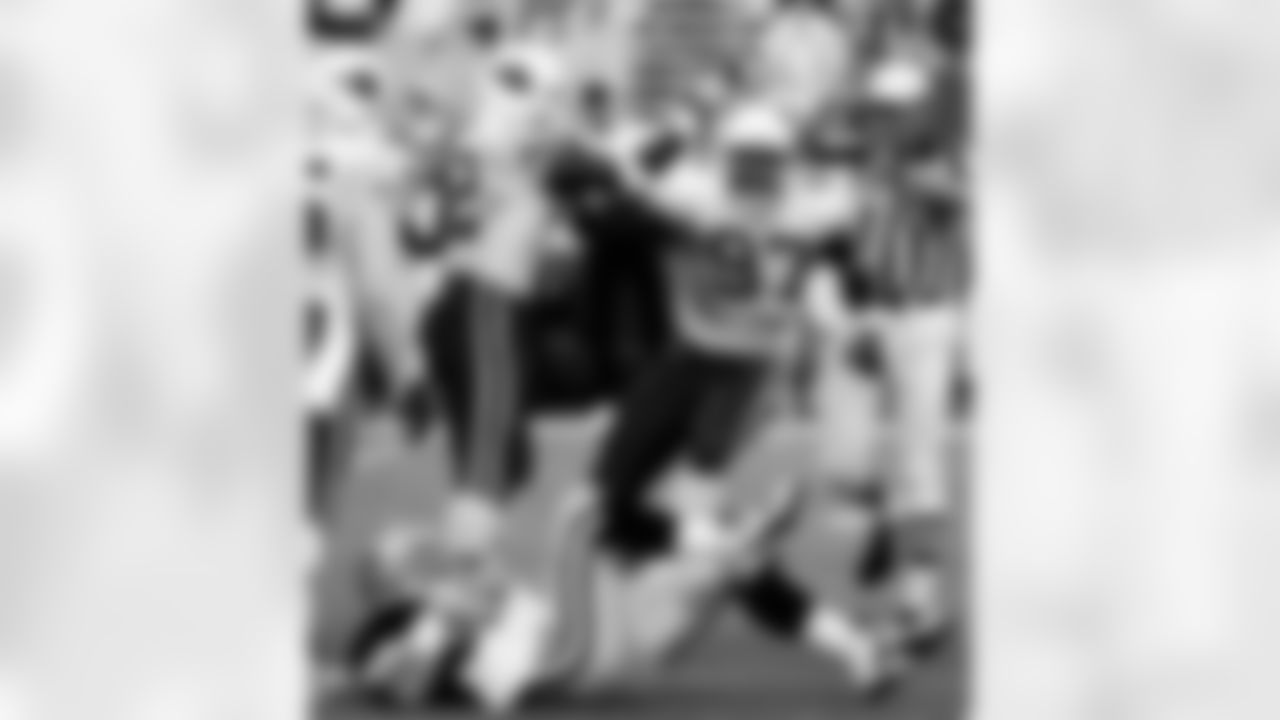
Defensive end Simeon Rice celebrates a sack against Troy Aikman in the Cardinals' 25-22 win over the Cowboys on Sept. 7, 1997.

Cardinals fans storm the field and tear down the goal post in celebration of the 25-22 overtime victory over the Cowboys, Sept. 7, 1997.
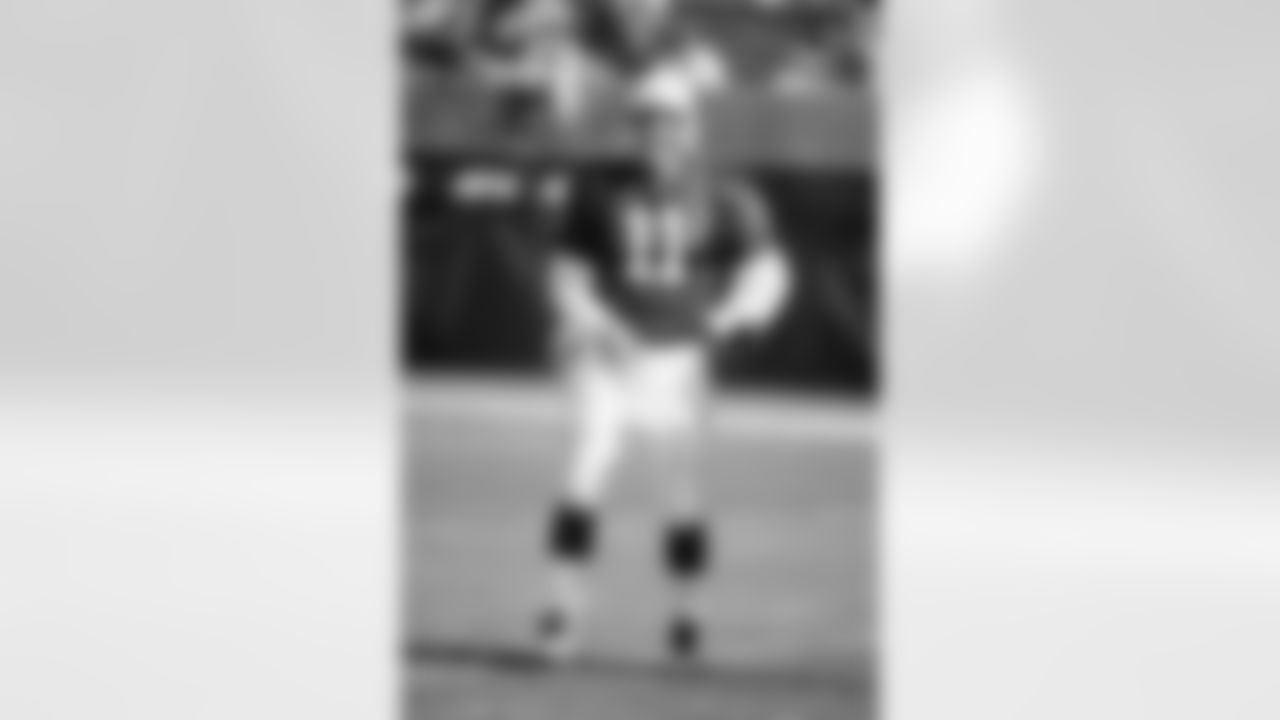
QB Kent Graham
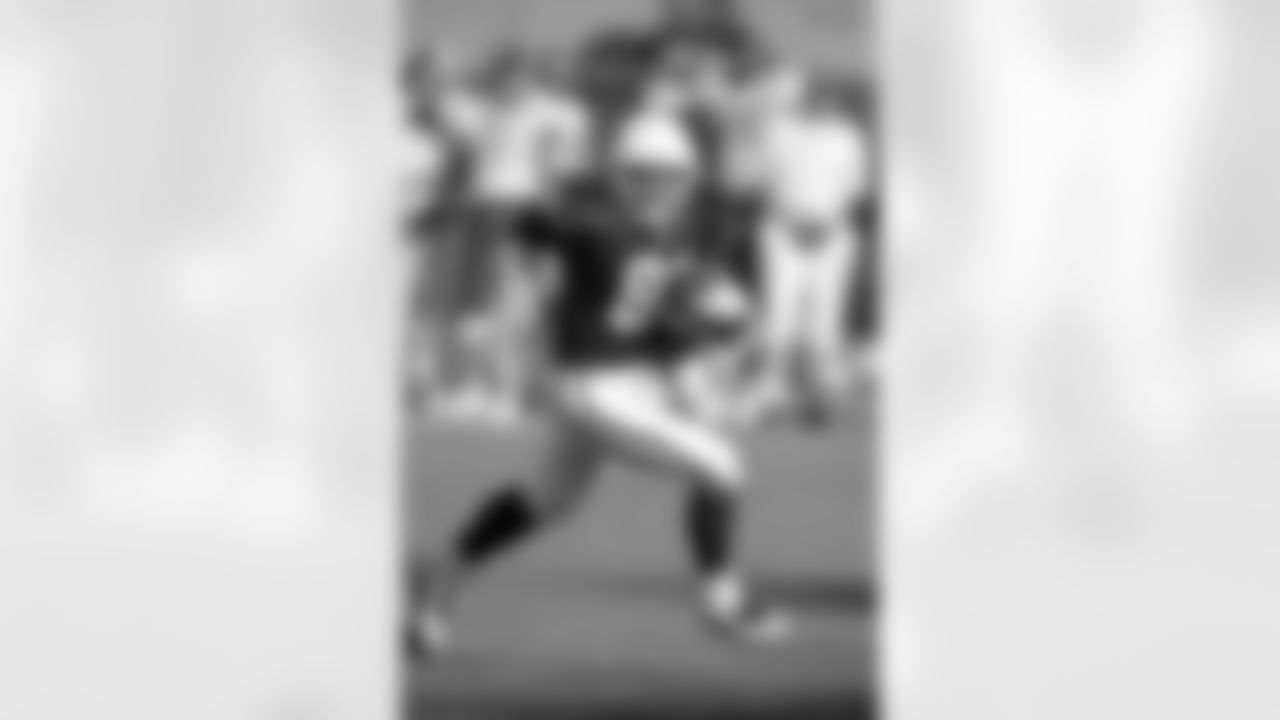
WR Frank Sanders

Sun Devil Stadium the night of Cardinals-Cowboys in 1997.

Fans during a Cardinals-Cowboys game at Sun Devil Stadium.
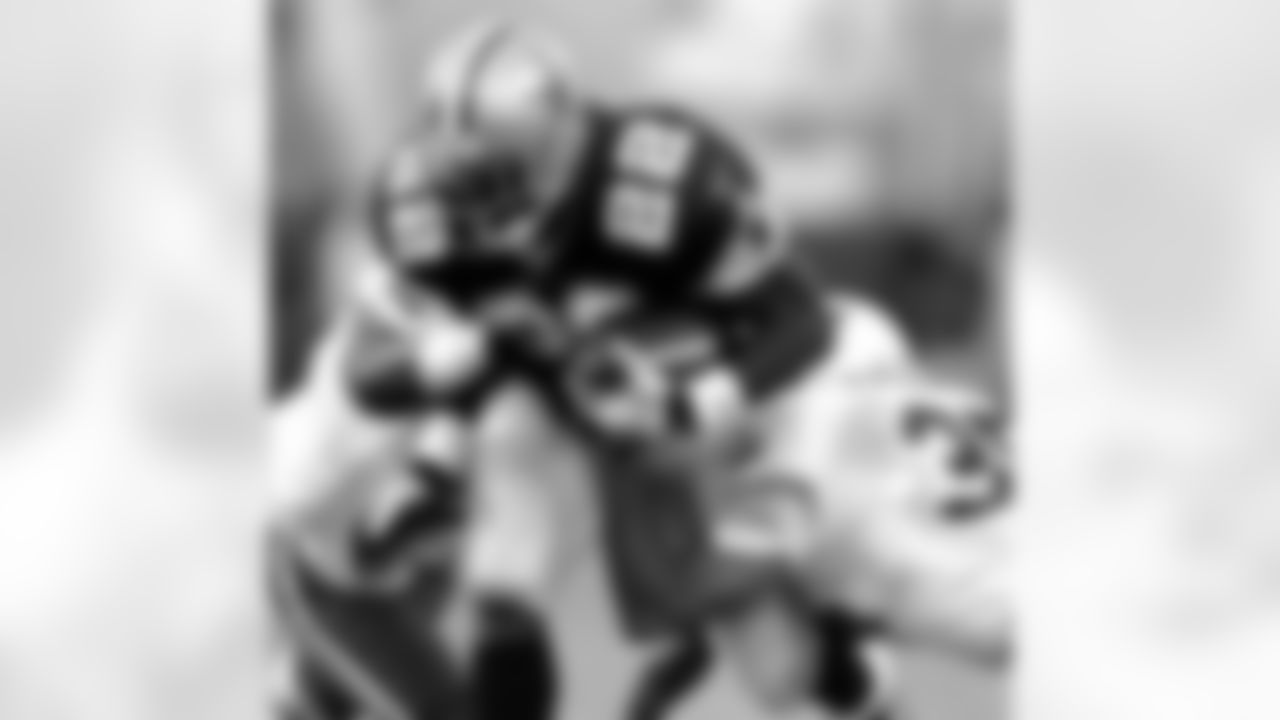
Cardinals defenders Aeneas Williams (35) and Terry Irving stop Cowboys running back Emmitt Smith during the Cards' 25-22 win on Sept. 7, 1997.
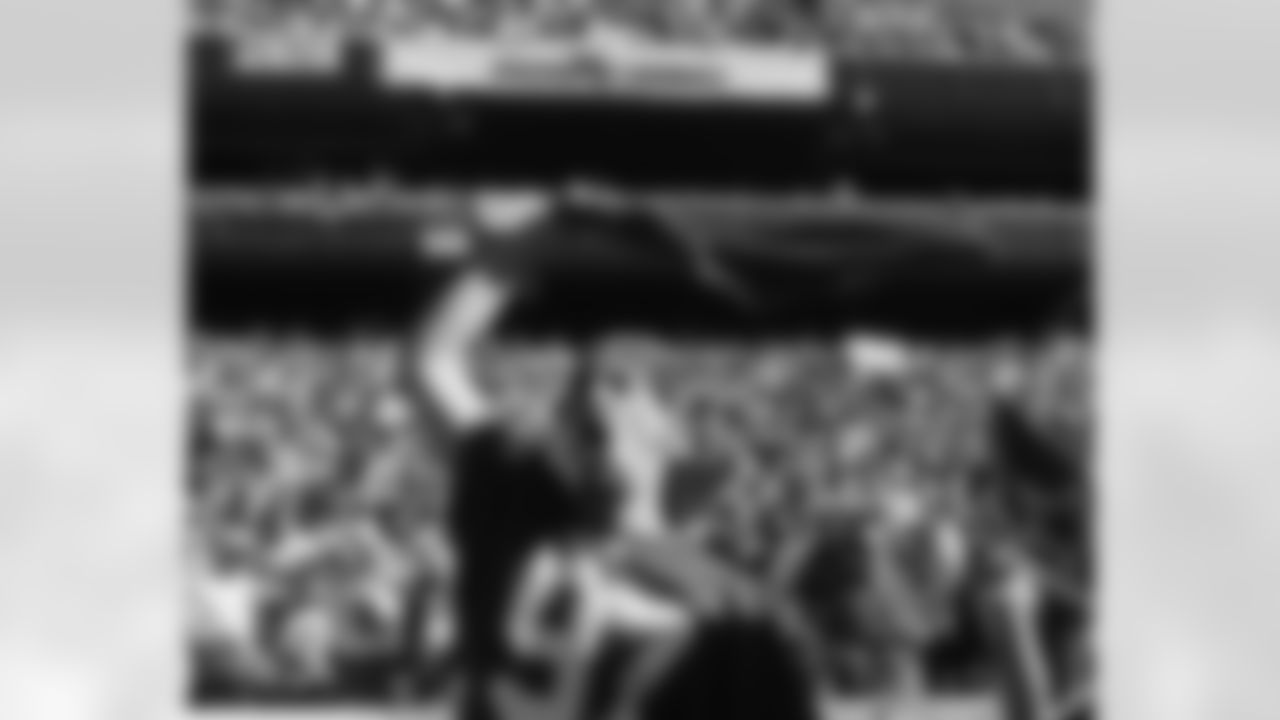
Fans cheer at a Cardinals-Cowboys game at Sun Devil Stadium.
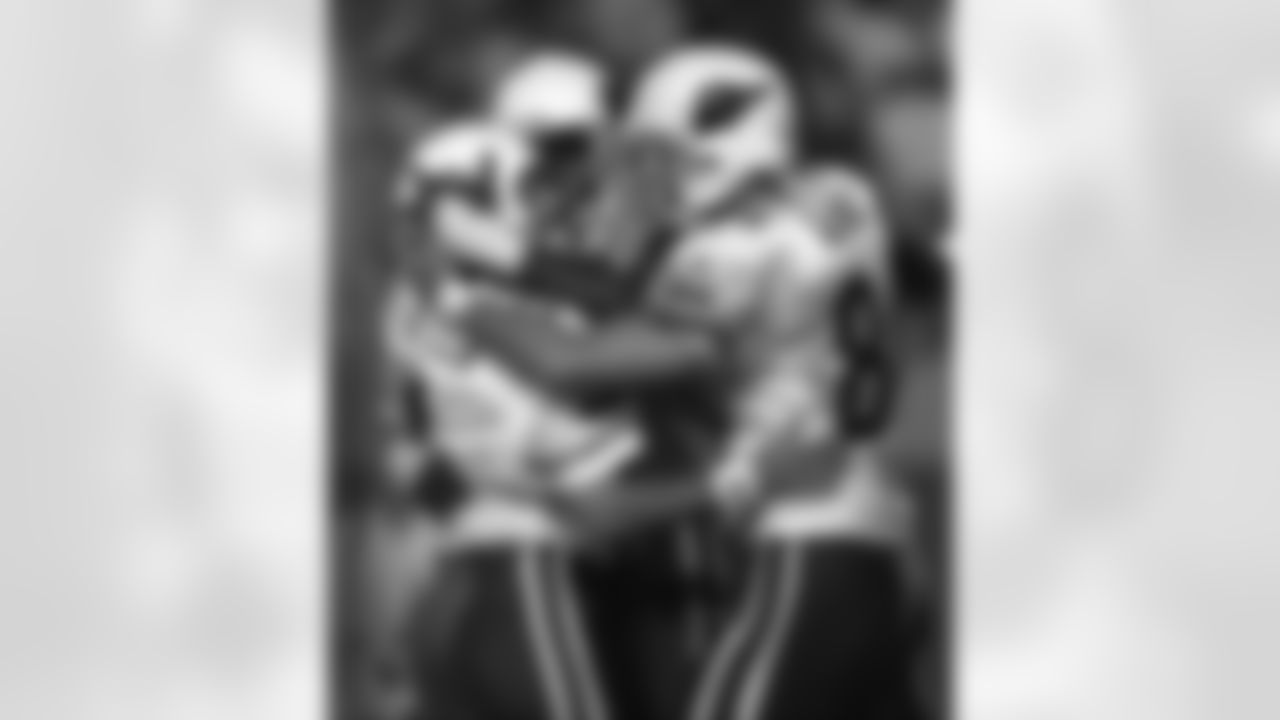
Kicker Kevin Butler (left) is hugged by teammates after booting the game-winning field goal against the Cowboys on Sept. 7, 1997.
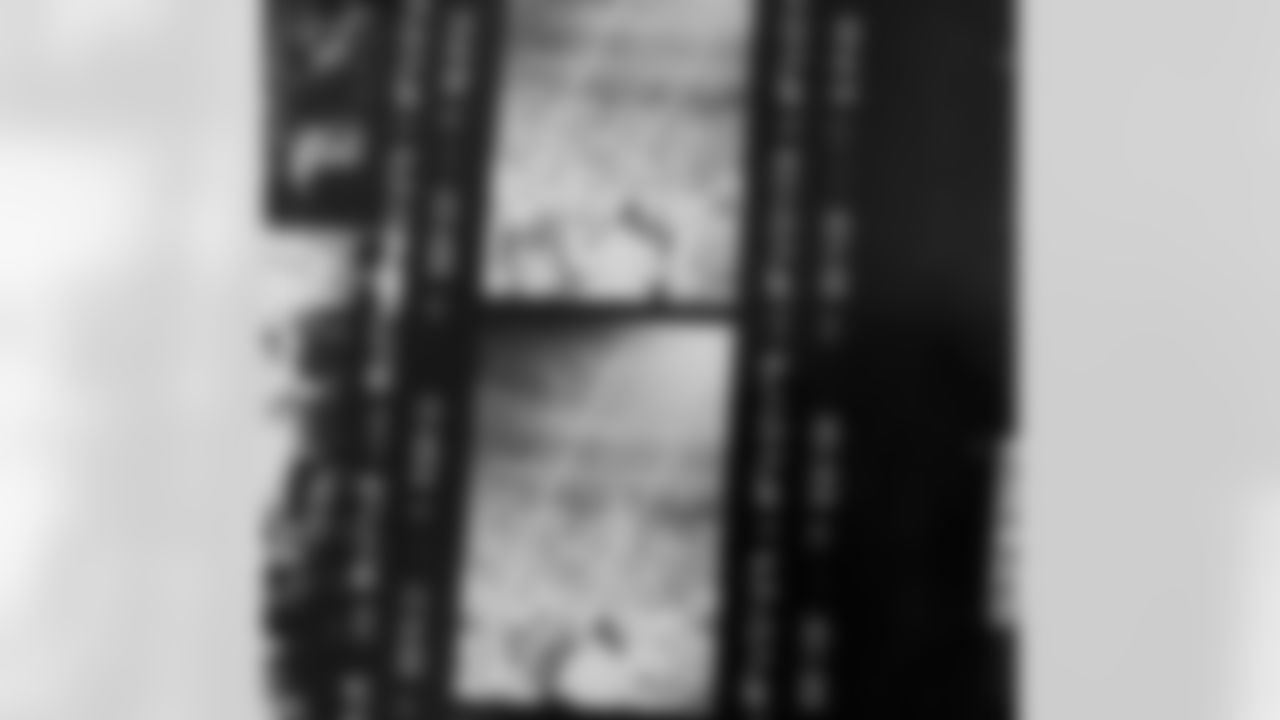
Contact sheet of photos of the goalposts coming down on Sept. 7, 1997.
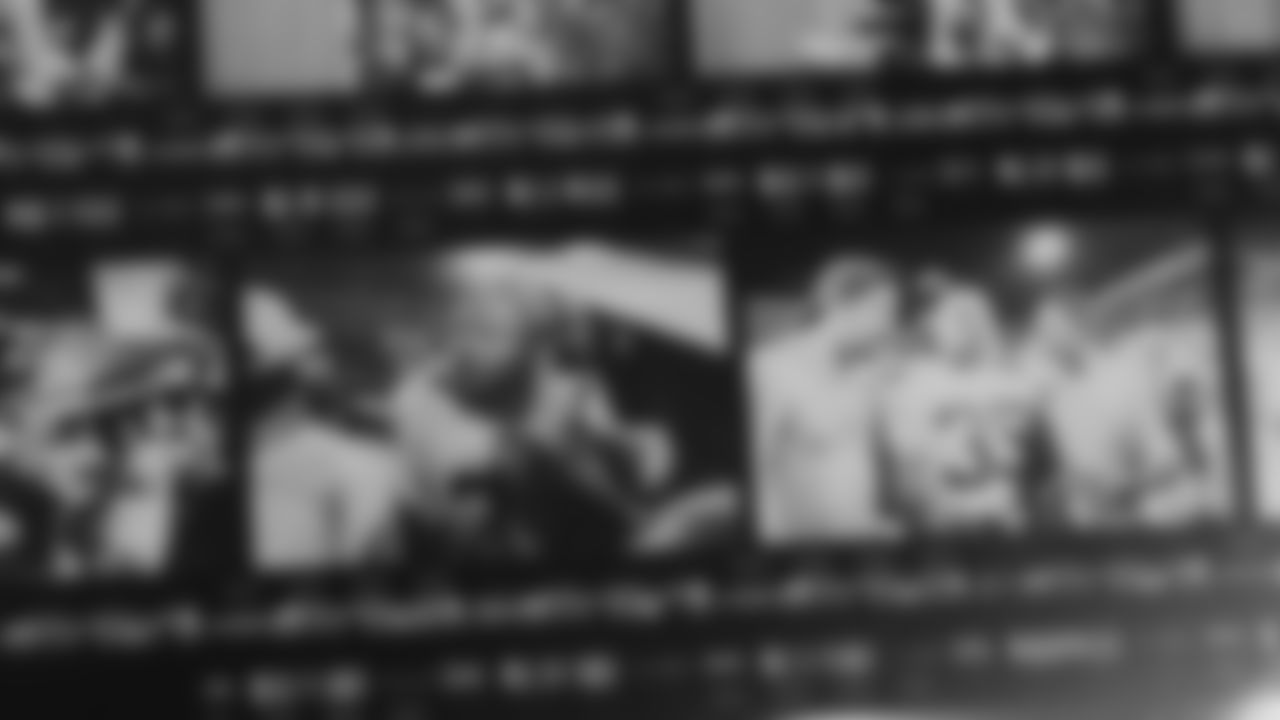
Contacts sheets of Larry Center (left) and Aeneas Williams (right) with fans after the game when the Cardinals beat the Cowboys on Sept. 7, 1997.








